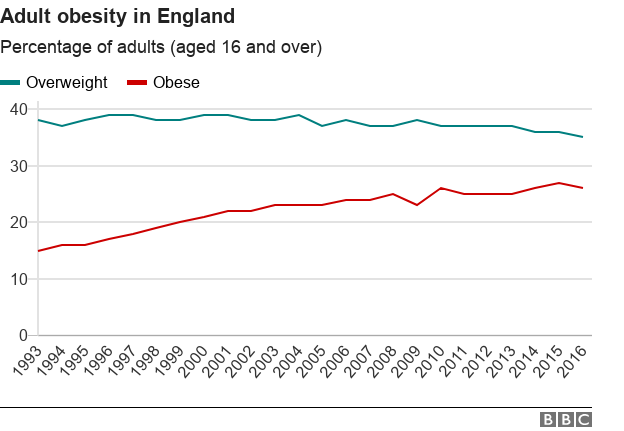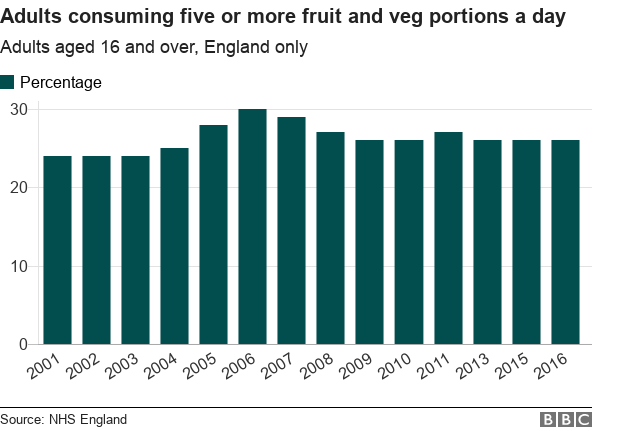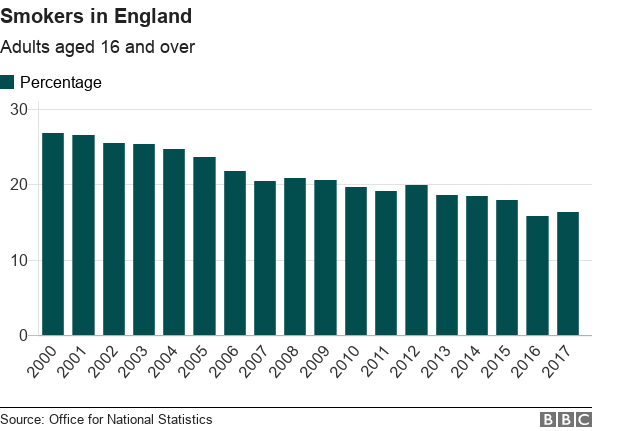Reality Check: Are public health campaigns working?
- Published

Health Secretary Matt Hancock wants to encourage people in England to make "better choices" around their alcohol, sugar, salt and fat intake, while getting more exercise.
He is promising to spend more on public awareness initiatives to prevent obesity in the latest in a long line of of public health campaigns over the years.
Three of the best-known health messages are eating five portions a day of fruit and vegetables, getting 150 minutes of exercise a week and quitting smoking.
But what evidence is there that these have worked?
The big picture
Before we turn to the campaigns, what is the scale of the obesity problem?

The rate of obesity among adults in England increased from 15% in 1993 to 26% in 2016, based on NHS survey data. However, it has remained fairly static since 2010.
Almost two-thirds (61%) of England's adult population is either overweight or obese, according to NHS England, as classified by their Body Mass Index (BMI)., external That's up from 53% in 1993.
BMI is calculated by dividing an adult's weight by the square of their height.
Five-a-day

Since 2003, the government has been urging people to eat five portions of fruit and vegetables a day., external
NHS England's own figures show that the percentage of the adult population reaching the target hit a 30% peak in 2006, when the message was still fairly fresh.
Since then, it's declined to 26%.
This is still a little above the 24% level measured before the five-a-day target was introduced.
By international standards, the UK ranks reasonably well. Out of the 34 countries that are members of the OECD (Organisation for Economic Cooperation and Development),, external the UK has the eighth highest proportion of the population eating at least one portion of fruit per day (63%) - compared to the OECD average of 57%.
Still, about three out of four members of the public still aren't getting five portions of fruit and vegetables - which the NHS recommends, external on advice from the World Health Organization.
150 minutes a week

The World Health Organization says adults aged 18 to 64 should do at least 150 minutes of moderate physical activity a week.
Since 2011, the NHS in England has been promoting this message., external So, are more of us doing what we're meant to?
The latest Health Survey for England, for 2016, shows 66% of men aged 19 and over are meeting the guidelines - unchanged since 2012.
For women of the same age, the figure was 58% - up from 56% in 2012.
Smoking
Successive governments have campaigned to reduce smoking, with the NHS's Smokefree campaign, external offering advice and support to people trying to give up.
The Labour government banned smoking in enclosed public places and workplaces in England in 2007.
The result is a marked decrease in the number of smokers.

According to the Office for National Statistics, 16.4% of adults currently smoke, compared with 19.9% five years ago.
Health warning
It is very difficult to directly link the perceived success or failure of public health campaigns with outcomes, because there are many different factors at play.
Changes in law, habits and tastes may all contribute to changes in attitude which may affect lifestyle choices. For example, some of the decline in smoking could be attributed as much to the rise of the e-cigarette as anything else.


- Published5 November 2018
